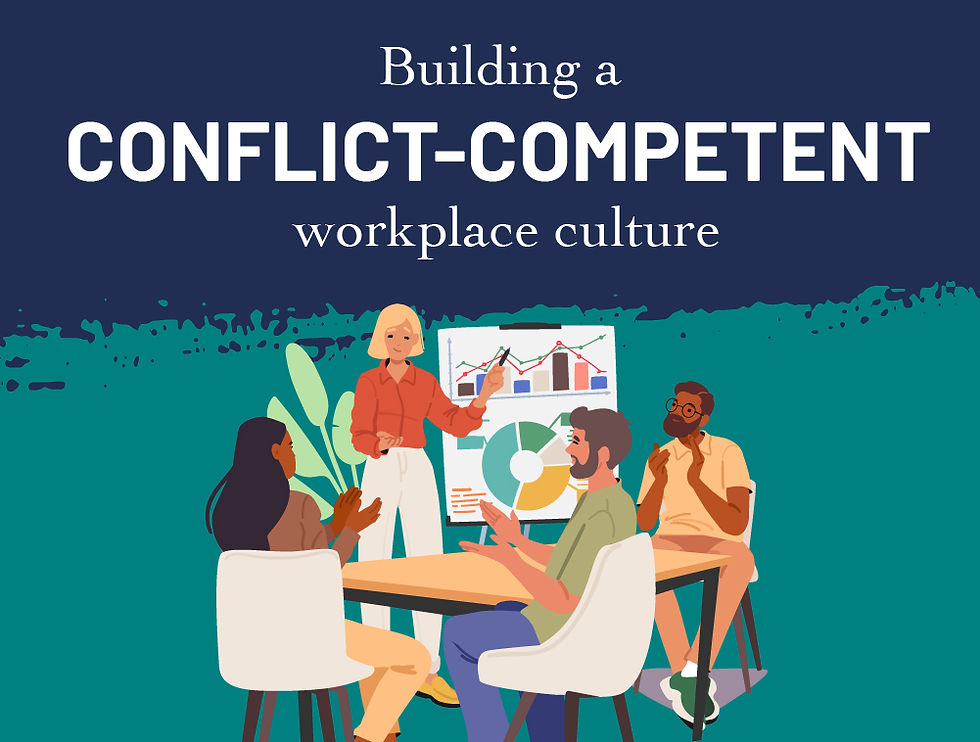Humanistic Mediation in the Workplace: Fostering Collaboration and Resolving Conflicts with Empathy
- Dr. Robyn Short

- Aug 1, 2023
- 3 min read
Updated: Sep 10, 2025
Humanistic mediation is a conflict resolution approach that emphasizes the importance of empathy, active listening, and understanding the underlying emotions and needs of all parties involved in the conflict.

In any workplace, conflicts are bound to arise due to myriad reasons, including diverse personalities, perspectives, and work dynamics. Handling these conflicts with sensitivity and understanding is essential to maintain a harmonious and productive work environment. Humanistic mediation, a conflict resolution approach grounded in empathy and collaboration, offers a compassionate and effective way to address workplace conflicts. This article delves into the concept of humanistic mediation and explores how it can foster collaboration and resolve conflicts in the workplace.
Understanding Humanistic Mediation in the Workplace
Humanistic mediation is a conflict resolution approach that emphasizes the importance of empathy, active listening, and understanding the underlying emotions and needs of all parties involved in the conflict. It prioritizes the human aspect of conflict, acknowledging that individuals have unique experiences, emotions, and values that influence their perspectives. The mediator in humanistic mediation plays a crucial role in facilitating open and honest communication, guiding participants toward a mutually beneficial resolution.
Creating a Safe and Supportive Environment to Resolve Workplace Conflict
One of the core principles of humanistic mediation is creating a safe and supportive environment for all parties involved. The mediator ensures that participants feel heard and validated, encouraging them to express their concerns, fears, and aspirations openly. By establishing trust and confidentiality, humanistic mediation enables participants to share their thoughts without fear of judgment or retaliation.
Active Listening and Empathy
At the heart of humanistic mediation lies the skill of active listening and empathy. Mediators in this approach focus on understanding the emotional undercurrents of the conflict, seeking to identify the root causes of the disagreement rather than merely addressing surface-level issues. Empathy allows mediators to put themselves in the shoes of each participant, enhancing their ability to facilitate meaningful dialogue and build rapport.
Transforming Workplace Conflicts Into Opportunities for Collaboration
Humanistic mediation views conflicts not as negative events to be avoided but as opportunities for growth and collaboration. Instead of trying to eliminate conflicts, the approach seeks to transform them into constructive conversations that lead to shared understanding and solutions. By encouraging participants to see conflicts as opportunities for learning and innovation, humanistic mediation promotes a positive and forward-looking mindset.
Preserving Workplace Relationships
In the workplace, unresolved conflicts can strain relationships and hinder effective teamwork. Humanistic mediation places significant emphasis on preserving relationships during conflict resolution. Mediators help participants recognize the importance of maintaining positive relationships, even amidst disagreements, and guide them in finding common ground to build upon.
Empowering Self-Determination
Humanistic mediation respects the autonomy and self-determination of the individuals involved. The mediator acts as a facilitator, helping participants generate their own solutions and agreements. By empowering individuals to take an active role in resolving the conflict, humanistic mediation fosters a sense of ownership and commitment to the outcomes.
Addressing Systemic Issues
Beyond individual conflicts, humanistic mediation acknowledges the potential influence of systemic issues on workplace conflicts. It encourages participants to explore how organizational culture, policies, and practices may have contributed to the conflict, leading to more comprehensive and sustainable resolutions that address underlying systemic concerns.
In the modern workplace, humanistic mediation emerges as a powerful and compassionate tool for managing workplace conflict. By placing empathy, active listening, and collaboration at the core of the process, humanistic mediation allows individuals to engage in constructive conversations that lead to resolutions grounded in mutual understanding and respect. The approach not only resolves immediate conflicts but also strengthens relationships, enhances teamwork, and fosters a positive work environment. Embracing humanistic mediation in the workplace nurtures a culture of empathy and compassion, propelling the organization toward success through collaborative problem-solving and innovation.
Workplace Peace Institute is an organization systems design and research firm that is singularly focused on creating workplace cultures where people thrive. Workplace Peace Institute supports small to mid-sized businesses in optimizing employee engagement, maximizing organizational productivity, and improving profitability by infusing human security and dignity as foundational attributes of their business model. Our Leadership Academy supports leaders in honoring basic human needs and dignity needs in the workplace, so they can actualize human potential in the workplace. The online Leadership Academy optimizes competencies in human behavior, communication skills, conflict resolution, and Diversity, Equity, Inclusion and Belonging to create highly engaged workplaces where basic human needs and dignity are consistently honored. All our courses are offered online and can be customized for in-person workshops and seminars.



